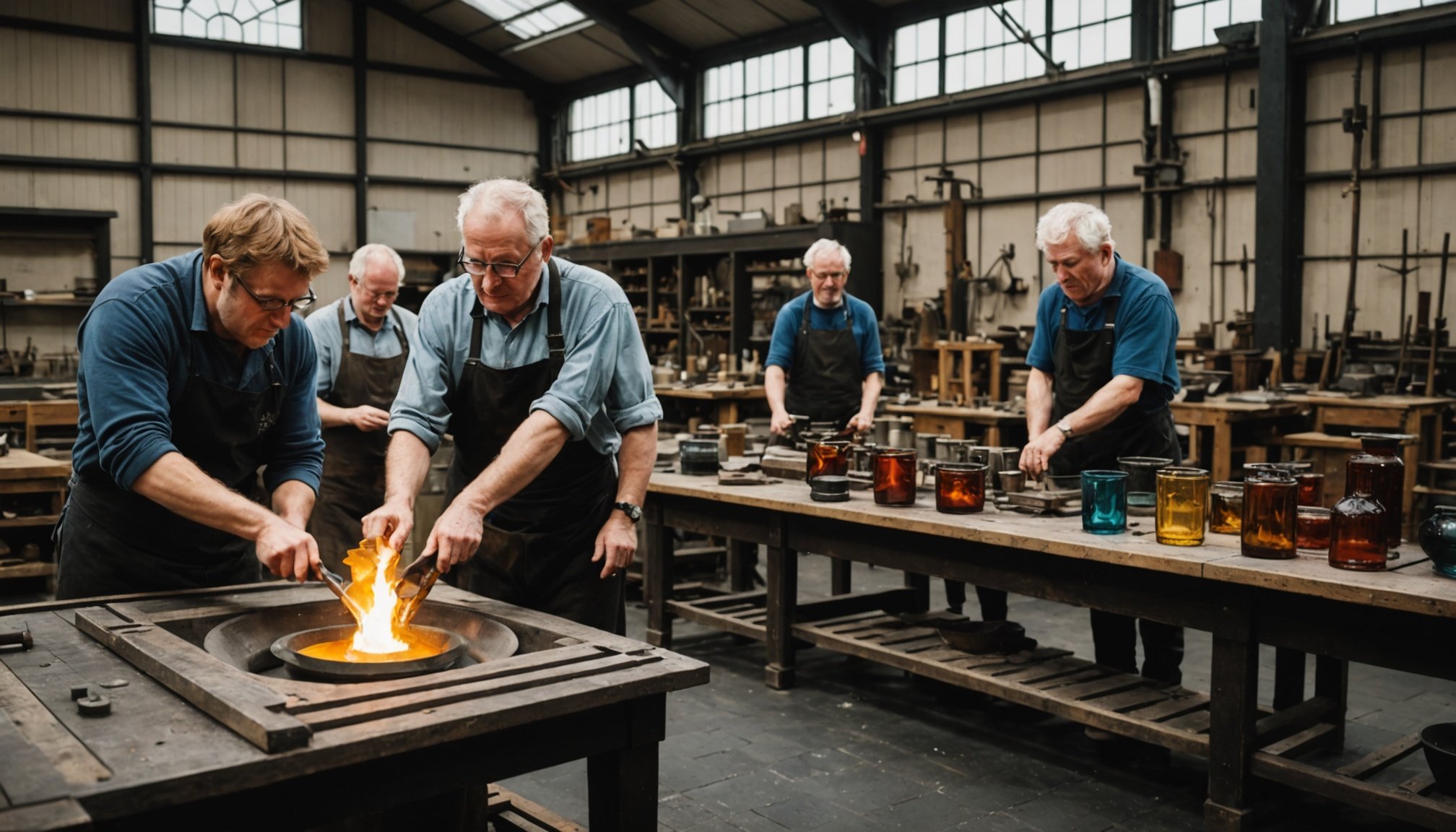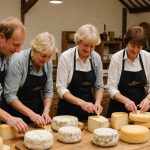Overview of British Glassmaking History
The British glassmaking history spans centuries, marked by innovation and artistic excellence. Origins trace back to Roman times, with significant developments occurring in the late 16th and early 17th centuries. It was during this period that the glassmaking landscape was transformed by the introduction of coal instead of wood in the glass furnace, sparking unique advancements.
The historical context for these changes is crucial. Post-medieval Britain saw glasshouses flourishing, particularly in regions like London and Newcastle, where access to raw materials was abundant. This set the stage for a craft that would become integral to British identity. The establishment of the Worshipful Company of Glass Sellers in the 17th century exemplified the trade’s growing significance.
Also to see : Discover the Top UK Destinations for Unforgettable Guided Tours of Medieval Castles
In terms of styles, various eras like the Georgian period showcased the elegance of lead glass, known for its brilliance and clarity. The Victorian age brought mass production and new techniques, diversifying glassware offerings. As a cultural artefact, glassmaking remained vital, supporting the economy through exports and exemplifying British craftsmanship.
Today, the rich legacy of British glassmaking is celebrated in museums and by collectors, preserving an art that continues to fascinate.
Also to read : Discover the UK Hotspots for Captivating Storytelling on the British Civil War
Top Destinations for Guided Tours
When exploring the best UK destinations with a rich history in glassmaking, diverse and fascinating sites await. Each destination offers a unique insight into this intricate craft. Choosing the right location for a guided tour depends on several criteria: accessibility, historical significance, and the presence of skilled artisans.
Noteworthy Destinations
-
Stourbridge: Known as a glassmaking hub, Stourbridge boasts a legacy spanning over 400 years. Visitors can witness live demonstrations and view historical glass collections, making it a remarkable destination for enthusiasts.
-
Sunderland: This city is home to the National Glass Centre, where innovative glassmaking techniques are exhibited. The centre’s guided tours provide an immersive experience, showcasing both contemporary and traditional practices.
-
Edinburgh: While Scotland’s capital might be famed for its historic castle, it also hosts workshops offering insights into Scotland’s glassmaking history accompanied by live demonstrations.
-
Bristol: Known for its bustling arts scene, Bristol has become a favourite spot for contemporary glass artists. Tours here often include visits to modern studios and galleries, reflecting the city’s vibrant artistic community.
Each of these guided tours not only highlights the skilled artistry and technical prowess involved in glassmaking but also provides visitors with a comprehensive understanding of the craft’s evolution and cultural impact.
Detailed Itinerary of Recommended Tours
Exploring historic glassmaking traditions can be a fascinating journey. Here, we present a rich tapestry of tour itineraries that capture this unique art form’s essence through guided tours at three distinct destinations.
Destination 1: Location and Tour Specifics
Known for its masterful craftsmanship, our first stop is the enchanting Glassblower’s Haven. This site, steeped in history, showcases the evolution of glassmaking through centuries. Participate in historical glassmaking tours led by seasoned artisans who bring ancient techniques to life. The tour lasts approximately 90 minutes and includes a hands-on experience where visitors can try their skills under expert guidance. Tickets, priced at a moderate fee, promise an insightful and interactive journey into this age-old craft.
Destination 2: Location and Tour Specifics
Next, venture to the Crystal Courtyard, where opulent displays highlight the artistic grandeur of glass. This guided tour divulges the secrets behind the famed glass figurines known worldwide. During the two-hour exploration, expect to witness live demonstrations paired with detailed narrations that illuminate the nuances of exquisite design work. The affordable entry fee includes a complimentary piece of artisanal glass, making it a cherished memento of your visit.
Destination 3: Location and Tour Specifics
Lastly, immerse yourself in tradition at the Vintage Vase Atelier, a site rich with folklore and stories. Here, the guided tours focus on vase production, with exhibits tracing back to ancient methods. Lasting an hour, these tours offer exclusive insights into the vibrant history of the region’s styles. The cost is reasonable, offering both education and entertainment in a breathtaking setting. Enjoy the opportunity to purchase authentic replicas crafted during your tour.
Expert Guides and Their Qualifications
Understanding glassmaking is significantly enhanced with the presence of expert guides. These individuals bring a wealth of glassmaking expertise to tours, ensuring visitors receive an informative and engaging experience. Each guide is meticulously selected for their comprehensive understanding of the craft, guaranteeing they possess the necessary qualifications. Their thorough knowledge allows them to explain complex processes simply, keeping the content accessible for all.
Having knowledgeable guides is crucial. They not only answer questions with high precision but also weave captivating narratives about the art and science behind glassmaking. This is achieved by providing clear and direct explanations to inquiries, enhancing the educational value significantly.
For instance, guides contribute significantly to glassmaking education through interactive sessions where visitors can witness, and sometimes partake in, glassmaking processes. By offering insights into both ancient techniques and modern innovations, they contribute to a deeper appreciation and understanding.
Moreover, expert guides often provide relatable examples, drawing connections between historical traditions and contemporary applications. Through their expertise, they help demystify the art of glassmaking, making it accessible and interesting to a wide audience, thereby fostering a greater interest in this intricate art form.
Visitor Testimonials and Experiences
Visitor testimonials are a profound way to gauge the real impact of the glassmaking tours. Encapsulating the narrative of past participants, they provide genuine insights into the experiences of those who have walked through the illustrious studios and workshops.
Many visitors express a newfound appreciation for the intricate art of glassmaking. Comments from participants often highlight how the tours transformed their understanding and perception of this ancient craft. One participant noted that watching the glassmakers in action was like witnessing a “ballet of fire and skill.” Such detailed feedback illustrates the captivating nature of these tours.
Tour feedback frequently underscores the educational aspect of the experience. Visitors appreciate the opportunity to interact with artisans, gaining first-hand knowledge of techniques and processes. For instance, seeing raw materials evolve into elaborate pieces via glassblowing left an indelible impression on many.
A notable highlight frequently shared is the chance to create their own glass piece, allowing visitors to immerse themselves fully in the art form. This hands-on experience often becomes the most cherished part of the visit, making the learning personal and memorable.
Through these testimonials, the tours’ multifaceted impact on visitors becomes evident, painting a vivid picture of its allure and educational value.
Practical Information for Tour Participants
Embarking on a tour requires thorough preparation to ensure a seamless and enjoyable experience. This section provides practical information on tour pricing, booking procedures, and travel logistics.
When considering the cost of a tour, it is essential to understand what is included in the pricing. Typically, tour pricing encompasses the services of a knowledgeable guide, transportation during the tour, entry fees to designated attractions, and possibly some meals. However, personal expenses such as additional meals, souvenirs, or gratuities are usually not included.
Booking a tour can be straightforward if you follow established procedures. Many companies offer online booking, which allows you to secure your spot effortlessly. Be aware of any cancellation policies before confirming your reservation. Some tours may offer full refunds if cancellations are made within a specified period, while others may impose penalties or be non-refundable.
Timing your visit is crucial for optimal enjoyment. Consider the best times to visit your chosen destination, taking into account the climate, seasonal events, and peak tourist periods to minimize crowd-related stress. Additionally, familiarize yourself with travel logistics, such as transportation options or restrictions that may affect your schedule. Planning around these practical aspects can significantly enhance your tour experience.










